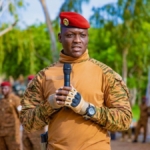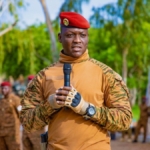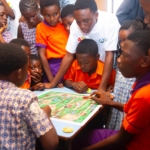
To understand Ibrahim Traoré is to understand a man confronted by the slow dissolution of the state itself — that apparatus of collective survival which, when it falters, leaves in its wake not merely administrative vacancy but the very erosion of human possibility.
He inherits not a kingdom in decline but a polity in active decomposition, where the instruments of governance have become hollow echoes in territories no longer answerable to any central authority save that of armed zealotry.
The coup of September 2022 was not, as might be readily supposed, an eruption of military ambition seeking merely to supplant a predecessor. Rather, it represented a profound admission that the existing structures of rule had become functionally incompatible with survival itself.
His predecessors, men of administrative bent and constitutional propriety, had presided over a nation where legitimate authority retreated daily before the advance of those who possessed only weapons and absolute conviction.
This is the crucible in which Traoré’s leadership must be forged — not in some abstract realm of political theory, but in the concrete reality of a state whose very existence hung in question.
What distinguishes his early manoeuvres is a certain clear-eyed acknowledgement of necessity. Where others might have sought grand gestures or sweeping transformations, Traoré moved with the precision of a man reading the room of power with exacting attention.
He consolidated his position within the military hierarchy not through the crude mechanics of elimination but through the subtler art of institutional choreography — placing adherents in positions of consequence, neutralising potential challengers through reassignment rather than destruction, maintaining the coherence of the force upon which all else depends.
This speaks to a mind attuned to the paradox at the heart of military rule: that the instrument of seizure must not be shattered in the act of grasping power, lest the hand itself become powerless.
The language he has chosen to speak — the vocabulary of pan-African assertion, the rhetoric of anti-colonial resistance, the invocation of sovereignty reclaimed — serves purposes both domestic and continental.
Within Burkina Faso itself, this discourse transforms the bare fact of military rule into something more palatable: resistance to the lingering tentacles of imperial domination, a nation reasserting its right to determine its own trajectory.
Externally, these utterances signal to neighbours and distant powers alike that Burkina Faso shall not be treated as a mere receptacle for the ambitions of others. It is the language of a small state asserting itself in a world where silence equals absorption.
Yet perhaps most revealing of Traoré’s pragmatic disposition has been his recalibration of the external alignments by which weak states navigate the currents of great power rivalry.
France, which had long served as the gravitational centre around which Burkinabé affairs revolved, became increasingly identified in the public imagination with failure — with strategies that had proven inadequate, with an order that could not deliver security, with a form of influence that seemed designed more to perpetuate dependency than to kindle genuine transformation.
Into this vacuum Traoré has drawn Russia, not as an ideological consort but as a provider of capabilities and, perhaps more crucially, as a counterbalance to the presumed hegemony of Western actors. This is the ancient choreography of statecraft: the weak state positioning itself at the intersection of competing powers, extracting maximum advantage from the friction between greater forces.
The engagement with Russian security services, the rhetorical distance from Paris, the cultivation of ambiguity regarding alignment — these are not the gestures of a man enslaved to ideology but rather of one who has grasped that ideological commitment itself becomes a form of enslavement for those who lack the material substance to sustain independent choice.
Traoré appears to understand that a nation such as Burkina Faso must perpetually dance between the great currents, neither fully accepting the embrace of any patron nor foolishly declaring its independence from all external calculation.
Yet here emerges the profound tension that no amount of tactical acuity can altogether dissolve. The consolidation of power, however deftly managed, addresses only the question of who shall wield authority within the state apparatus.
It does not address the foundational question that haunts contemporary Sahel: whether the state itself, in its present form and present capacity, possesses the means to reassert legitimate dominion over the territories that nominally comprise it.
The insurgency that prompted Traoré’s seizure of power has shown little sign of retreat in the face of new leadership. Indeed, the geography of conflict has remained stubbornly resistant to the applications of force, suggesting an adversary whose power derives not from conventional military organisation but from the capacity to appear and vanish within the social fabric itself.
This is the cruel paradox confronting any leader in circumstances such as these: that the very skills which bring one to power — the reading of institutional dynamics, the neutralisation of rivals, the manipulation of external alignments — are not necessarily the skills required for state reconstruction in the face of insurgency rooted in social fracture and ideological commitment.
Traoré must govern a nation where significant portions of the territory have effectively passed beyond the reach of his authority, where economic collapse proceeds in parallel with military failure, where the reservoir of public patience necessarily depletes with each season that brings neither security nor material improvement.
What remains to be determined is whether the political intelligence Traoré has demonstrated in consolidating his power extends to the far more exacting challenge of restoring state capacity under conditions of profound constraint.
To read the weather is not yet to command it. To move pieces upon the chessboard of power is not yet to alter the fundamental conditions that render the game itself increasingly difficult to play.
His tenure shall ultimately be measured not by the elegance of his manoeuvres but by his capacity to accomplish what none before him have achieved: the restoration of Burkina Faso as a functioning state capable of defending its borders, providing for its people, and reimposing the authority of law across the expanse of its territory. Until that transformation occurs, all else remains preliminary.
The author, V. L. K. Djokoto (b. 1995), is a forward-thinking Ghanaian cultural theorist, financier and gallerist. He leads D. K. T. Djokoto & Co — an old-fashioned top-tier multi-family office, established in 1950. V. L. K. Djokoto is the author of ‘Revolution’ and a play, ‘Afro Gbede’.
- President Commissions 36.5 Million Dollars Hospital In The Tain District
- You Will Not Go Free For Killing An Hard Working MP – Akufo-Addo To MP’s Killer
- I Will Lead You To Victory – Ato Forson Assures NDC Supporters
Visit Our Social Media for More




